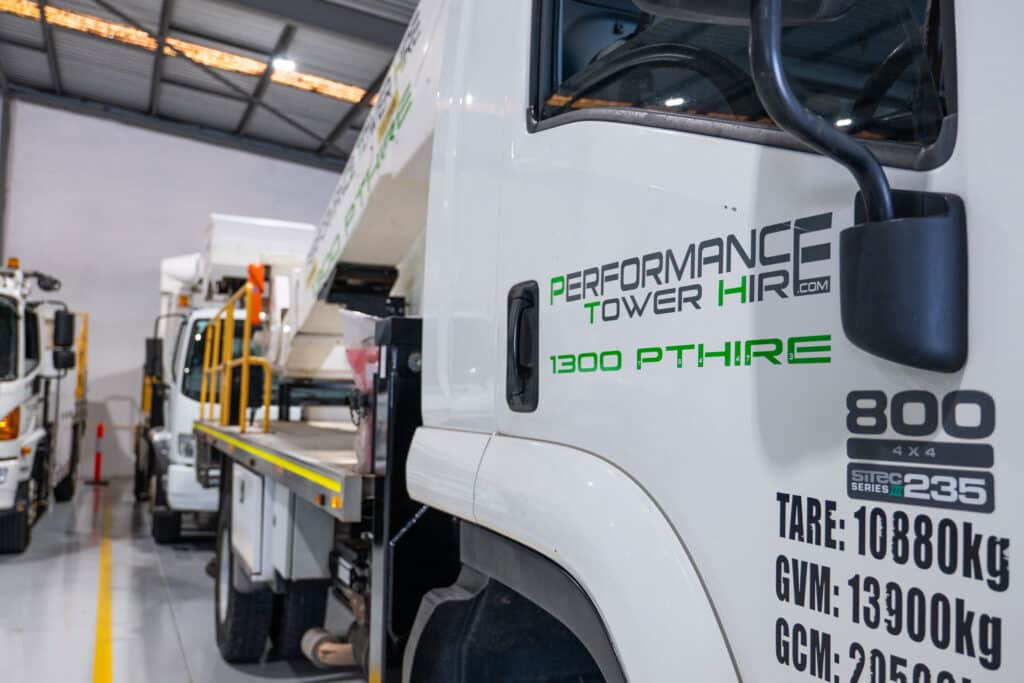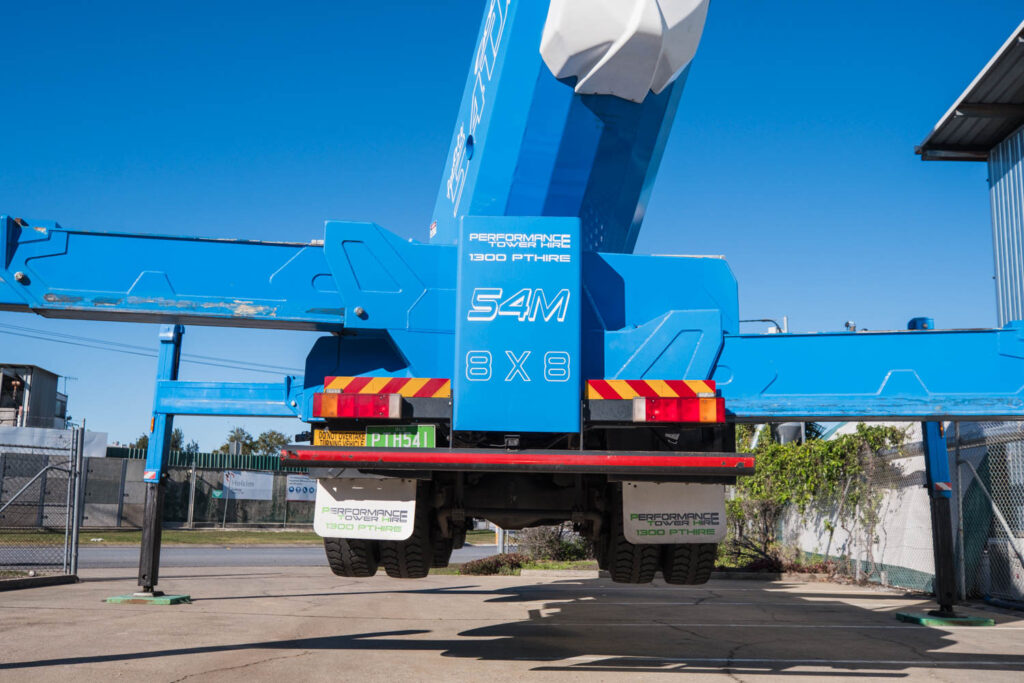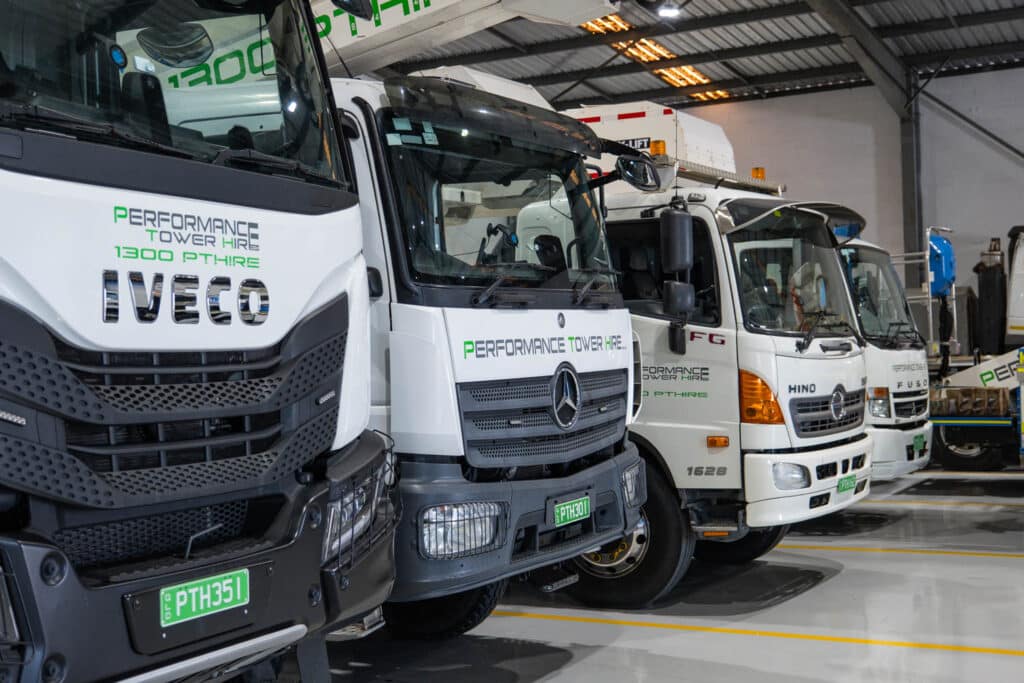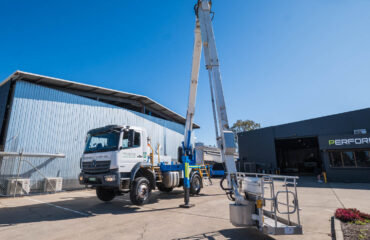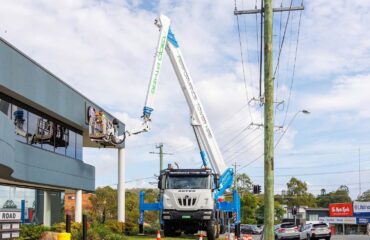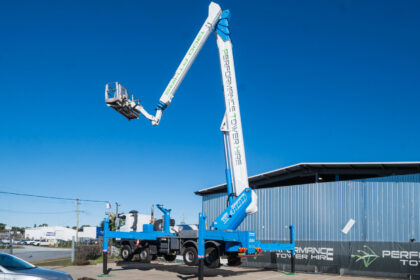
Working at heights comes with a certain level of risk, no matter what job you’re undertaking. Safety isn’t an option – it’s something you need to rigorously adhere to so that your team and worksite are protected.
At Performance Tower Hire, your safety on the job is our absolute priority. When you hire an elevated work platform from us (or any other EWP hire company), there are key steps to take to ensure safety is adhered to at every step of the job. We’re going to go over them today in this EWP hire safety checklist, so you can enjoy safer, more efficient and successful working at heights jobs!
1. Choose the Right EWP for the Job
Every job is different, and so is every EWP. Picking the right machine for your site is the first step in keeping everyone safe.
Some of the factors to take into consideration include:
- Is the job indoors or outdoors? If its indoors, what is the access to the building like? You want to hire a machine that can fit into the building, yet still be able to work at the height you require.
- Height and reach: The job needs to be within the capabilities of the machine. We recommend hiring an EWP that can comfortably reach the required height, rather than one that is pushed to the maximum limit.
- Terrain and weight capacities: Check whether the ground is stable and what kind of load you’ll need to lift. This includes people, tools and materials.
If you’re unsure which EWP is right, chat to our team at Performance Tower Hire. We know the local conditions and understand Queensland worksites. We’ve also got a wide range of EWPs for hire, and will help match the right machine to your task.
2. Choose the Right Hire Company
Not all hire companies are created equal. A well-maintained, modern fleet can make the difference between a safe job and a risky one.
Below are some basic requirements of EWP hire companies. These are boxes that should be ticked – it’s a bit of a red flag if they’re not.
- Has an up-to-date service history of each machine, with evidence of regular inspections.
- Gives pre-hire safety and operational briefings.
- Responsive in communications and have a support team on hand in case something goes wrong on site.
- Up to speed with Queensland safety regulations and can advise on licensing and compliance.
3. Make Sure Your Operators Are Qualified
In Queensland, operator licensing and training requirements are clearly defined:
- EWP under 11 metres: You don’t need a High Risk Work (HRW) Licence, but you do need training or a Verification of Competency (VOC) that’s relevant to the machine. Site induction and supervision are still essential.
- EWP over 11 metres: A High Risk Work Licence (WP Class) is mandatory. Operators must also be familiar with the specific type of machine they’re using.
It’s the hirer’s responsibility to make sure everyone using the EWP is appropriately qualified. That includes checking:
- Current licences and VOCs.
- Recent refresher training.
- Site inductions and supervision arrangements.
If you don’t have qualified operators on your team, Performance Tower Hire offers wet hire. This means you get a fully qualified and experienced operator along with your machine hire.
4. Conduct a Comprehensive Pre-Start Checklist
Before operating any EWP, a thorough pre-start inspection is non-negotiable. This should be done daily, ideally at the start of each shift.
Here’s what to check for:
Visual Checks
- Fluid leaks, rust or corrosion.
- Check tyres for wear or damage. Note tyre pressure too.
- Inspect guardrails, gates and harness anchor points.
- Make sure decals and warning labels are intact and readable.
Functional Checks
- Test all controls (ground and platform) to make sure they respond correctly.
- Check the brake and steering.
- Are all the lights working? What about alarms and switches?
- Put the platform through its full range of motion to make sure everything is in order.
Documentation
- Check the logbook to ensure recent inspections were all in order.
- Make sure servicing has been completed regularly on the machine.
- Review your Safe Work Method Statement (SWMS) for the day.
Environment
- What are the ground conditions like? Are there steep slopes, wet soil or hidden obstacles?
- Check that no overhead hazards such as electricity cabling will impact your job.
- Check the weather conditions for the upcoming time period – adverse weather can affect the safe operation of your elevated work platform.
Emergency Preparedness
- Find the emergency buttons on the machine and double-check your team is familiar with them.
- Test emergency lowering controls from the ground and the basket.
- Review your site’s rescue plan. Your team needs to know who’s responsible for what and how to respond.
If anything doesn’t look or feel right, report it to the hire company immediately and don’t use the machine.
5. Set Up a Safe Work Zone
There needs to be clear boundaries around your work area. Workers or passers by in the vicinity should be aware that risky work is taking place there.
- Establish exclusion zones to keep pedestrians and vehicles out.
- Post clear signage warning others that EWP work is in progress.
- Maintain safe clearances from powerlines.
- Assign a spotter if needed, especially in busy areas.
You want clear communication between operators and ground crew during a working at heights job. This is key to avoiding accidents.
6. Monitor Weather and Site Conditions
Queensland weather can turn quickly, so keep an eye on conditions throughout the day.
- Wind: Sitting in a basket high up in the air can be pretty hair-raising when the wind picks up. EWPs have a wind rating, make sure you’re operating in wind levels the machine is comfortable with.
- Storms: Is there lightning around? Stop work immediately.
- Rain: You don’t want to be working in the rain. Platforms get slippers and communication becomes harder.
If weather conditions deteriorate, lower the platform, secure the machine, and wait it out. It’s always best to err on the side of caution.
7. Emergency Planning and Communication
No matter how meticulously you’ve planned, accidents and emergencies can still happen. You want to be prepared for them.
- Your trained personnel on site need to be clear on how to lower the EWP in an emergency.
- Keep radios or phones on hand for clear communication.
- Brief everyone at the start of the day so they know the procedure if something goes wrong.
At Performance Tower Hire, we can provide advice on best-practice emergency planning and procedures. Just check in with our team when you hire an EWP from us.
8. Returning the Machine Safely
Once the job’s done, it’s important to return the machine in the same condition you hired it. A well-looked-after machine is safer for the next hire and avoids unnecessary repair fees.
- Refuel or recharge if required.
- Clean down the platform if it’s muddy or dirty.
- Report any issues, faults or damage.
Contact Performance Tower Hire for Your EWP Hire
Staying safe when hiring an EWP for working at heights isn’t complicated; it just requires consistency and commitment. It’s about being prepared, choosing the right equipment and having an experienced and knowledgeable team.
At Performance Tower Hire, we offer impeccably maintained EWPs, expert guidance, and fast local support to worksites across Brisbane and South East Queensland. Whether you’re on a small maintenance job or a major construction project, our team will help you choose the right machine and work safely from day one.
Get in touch with Performance Tower Hire today to book your next EWP hire.
EWP Hire Safety FAQs
Do I need a licence to operate an EWP in Queensland?
For platforms under 11m, formal licensing isn’t required, but you do need relevant training or a VOC. For EWPs over 11m, a WP class High Risk Work Licence is mandatory.
What happens if it rains during the hire period?
If the weather turns bad, lower the platform, secure the machine and wait until conditions improve. Never operate in storms or high winds.
Can I move the machine between worksites?
Yes, but you’ll need to let Performance Tower Hire know so they can advise on transport and site-specific considerations.
How far in advance should I book an EWP?
For larger jobs, booking early is best to lock in availability. Smaller machines can often be organised quickly, but demand can spike during busy periods.
What support does Performance Tower Hire offer during the hire?
If you experience any issues, PTH’s local team can provide fast technical support, troubleshooting, or a replacement machine where needed.


